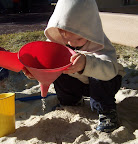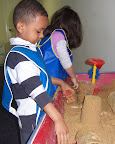What is a Scientist? Resources for young children
By Peggy Ashbrook
Posted on 2010-09-06
 What do your students think of when you talk about scientists? Is it Albert Einstein with long white hair, a person in a lab coat working with test tubes, or Sid the Science Kid? The work of science inquiry takes place in labs and many other locations. Broaden your students’ appreciation of science by broadening their understanding of the work of scientists. Read biographies, set up imaginative play centers with tools and clothes for working scientists, and invite local scientists of all kinds to visit your class for a short visit to discuss their work. Here are some resources to get you started:
What do your students think of when you talk about scientists? Is it Albert Einstein with long white hair, a person in a lab coat working with test tubes, or Sid the Science Kid? The work of science inquiry takes place in labs and many other locations. Broaden your students’ appreciation of science by broadening their understanding of the work of scientists. Read biographies, set up imaginative play centers with tools and clothes for working scientists, and invite local scientists of all kinds to visit your class for a short visit to discuss their work. Here are some resources to get you started:
Book resources for scientist biographies
Search the NSTA Recommends book reviews for “scientist” at http://www.nsta.org/recommends/?lid=tnav to find books about Scientists at Work, Extreme Scientists, Frog Scientists, and Scientists Who Made History.
American Library Association, Great Websites for Children: Biographies, http://www.ala.org/gwstemplate.cfm?section=greatwebsites&template=/cfapps/gws/displaysection.cfm&sec=11
Resources about scientists working today
Scientist at Work blog about scientists working today: http://scientistatwork.blogs.nytimes.com/
Read about soils scientists at: http://soils.usda.gov/education/facts/careers.html , and Soil Science Society of America https://www.soils.org/lessons/ask
Cool Careers at Sci4Kids, Agricultural Research Service, http://www.ars.usda.gov/is/kids/CoolCareers/coolestcareers.htm
Resources about inquiry
A Study Guide: Inquiry Science in the Elementary Classroom from the Education Development Center, Inc, http://cse.edc.org/products/inquiryscienceelemclassroom/default.asp (including the graphic on the flow of science inquiry in elementary grades, by Hubert Dyasi and Karen Worth at http://cse.edc.org/products/inquiryscienceelemclassroom/Inquiry.pdf )
University of California Museum of Paleontology. Understanding Science, http://undsci.berkeley.edu/index.php has another useful graphic on “How science works” at http://undsci.berkeley.edu/images/flowchart_35.pdf
National Research Council (NRC). 1996. National science education standards. Washington, DC: National Academy Press. http://www.nap.edu/openbook.php?isbn=0309053269
American Association for the Advancement of Science. 1993. Benchmarks for Science Literacy. See the grade 2 statement of what all students should know and be able to do in science, mathematics, and technology by the end of grade 2. http://www.project2061.org/publications/bsl/online/index.php
Resources on how children’s play supports their learning
 Articles on Supporting Pretend Play in Early Childhood Research & Practice, on how teacher support of dramatic play (such as pretending to be a veterinarian) can support knowledge and skill development in many curriculum areas, and take a look through the extensive bibliography on play at: http://ecrp.uiuc.edu/v10n2/introduction.html
Articles on Supporting Pretend Play in Early Childhood Research & Practice, on how teacher support of dramatic play (such as pretending to be a veterinarian) can support knowledge and skill development in many curriculum areas, and take a look through the extensive bibliography on play at: http://ecrp.uiuc.edu/v10n2/introduction.html
Can the Right Kinds of Play Teach Self-Control? By Paul Tough. The New York Times, September 25, 2009. A version of this article appeared in print on September 27, 2009, on page MM31 of the New York edition. http://www.nytimes.com/2009/09/27/magazine/27tools-t.html?_r=2&ref=magazine
National Association for the Education of Young Children. 2009. Developmentally Appropriate Practice in Early Childhood Programs Serving Children from Birth through Age 8. http://www.naeyc.org/files/naeyc/file/positions/PSDAP.pdf
The Serious Need for Play by Melinda Wenner. Scientific American Mind. January 28, 2009 http://www.melindawenner.com/Clips_files/MiQ109Wenn2p.pdf
Expose your children to the work of scientists through books, visiting scientists, fieldtrips, and play. Comment below to add your resources to this list.
Peggy
Disclaimer: The views expressed in this blog post are those of the author(s) and do not necessarily reflect the official position of the National Science Teaching Association (NSTA).


